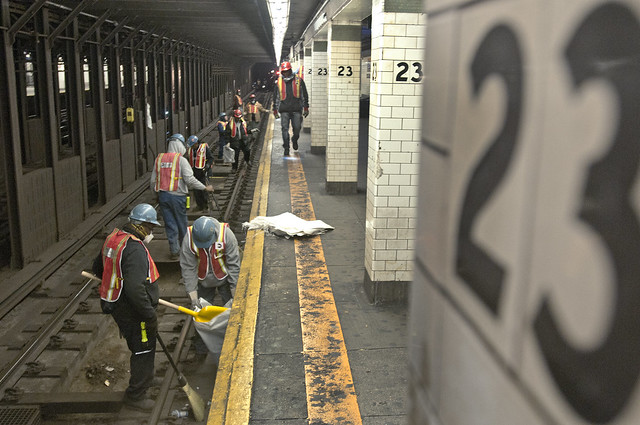As Sunday turned into Monday, the current contract between the MTA and TWU Local 100 expired. The two sides maintained talks throughout the weekend but were unable to come to an agreement. A strike seems exceedingly unlikely as, by all accounts, new MTA CEO and Chairman Joe Lhota and Union President John Samuelsen have a solid weekend relationship, but it’s unclear what impact the end of the contract will have on both the negotiations and transit operations.
In a statement released shortly after midnight, the authority vowed to keep open their talks. Considering the MTA’s current fiscal position, arbitration is not currently under consideration. “Even though the MTA and TWU Local 100 have negotiated through the weekend, we have been unable to reach a settlement prior to the expiration of the contract,” the MTA explained. “While we remain far apart, the MTA will continue to negotiate in good faith in the hope of reaching a settlement.”
The TWU, at least in public, took a more strident tone. Speaking at a rally to honor Martin Luther King, Jr., Samuelsen voted to keep up the fight. “I’m going to go back into the hotel and I’m going to tell the MTA chairman and the governor they can take their set of demands and shove it,” the union leader said. “We’ll fight them until they relent and give us a fair contract.”
Pete Donohue of The Daily News had more:
The MTA demands include establishing a new class of part-time bus drivers, five unpaid vacation days and overtime after 40 hours — instead of after eight hours in a day. MTA officials also have said any wage increases must be paid for by work-rule changes that cut costs.
One source close to the negotiations said there appeared to be pressure coming from the Cuomo administration not to grant workers even a small pay increase. The Cuomo administration last year reached deals with the state’s two largest unions that froze pay rates for the first three years of five-year deals…
Despite the bleak outlook Sunday, there was progress on some fronts, sources said. The MTA has agreed to improve the bathroom facilities for female workers in the subway and identify suitable locations for female bus drivers to make pitstops along their routes.
The biggest gap in negotiations ultimately concerns the money. Lhota has vowed to uphold former MTA head Jay Walder’s pledge to maintain a net-zero labor increase while Samuelsen is fighting against it. Simply put, though, the MTA and New York State do not have the money for an increase in the cost of the TWU’s contract. Things aren’t yet at a head, but with the contract expired, the future remains murky.
Without a contract, TWU workers can make their displeasure with the situation known. The union could institute letter-of-the-law slowdowns and other legal measures that can gum up transit operations. It is highly unlikely that the union would strike, but as Jan. 16 dawns, there is no contract in place between the TWU and MTA. Anything is now possible.















 (Rockaway Shuttle)
(Rockaway Shuttle)
 Queens residents along the Flushing line hoping for a quick trip into Manhattan are going to be out of luck until April. Starting next weekend and continuing through April 2, 2012, Transit is suspended weekend 7 service between Queensboro Plaza and Times Square. Furthermore, the Court Square station will be shuttered entirely from January 21-April 2. So much for that
Queens residents along the Flushing line hoping for a quick trip into Manhattan are going to be out of luck until April. Starting next weekend and continuing through April 2, 2012, Transit is suspended weekend 7 service between Queensboro Plaza and Times Square. Furthermore, the Court Square station will be shuttered entirely from January 21-April 2. So much for that 
